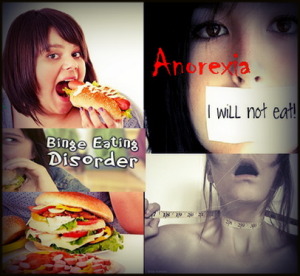Difference between Binge Eating Disorder, Anorexia (Anorexia Nervosa) and Bulimia Nervosa

Difference between Binge Eating Disorder, Anorexia (Anorexia Nervosa) and Bulimia Nervosa
Are you eating abnormally without knowing the root cause?
Then and there, keep your glance here. Psychologists discuss about disorders that are mainly associated with over-eating, Binge eating disorder, Bulimia nervosa and Anorexia disorder. This post of Researchpedia tends to explore the basic and major difference between Binge Eating Disorder, Bulimia Nervosa and Anorexia (Anorexia Nervosa). Here is the description to catch the concept of disorders.
What is Binge Eating Disorder?
It is an obsessive overeating. The patients of binge eating disorder consume more food in order to overcome unwanted stress and cause weight gain.
What is Anorexia (Anorexia Nervosa)?
It is an opposite disorder when compared to binge eating disorder. The patients of anorexia are scared of gaining weight and look skinny.
What is Bulimia Nervosa?
Bulimia Nervosa is known to be a dangerous and life threatening condition. It is more common in females. In which the patient eats a lot of food, and may opt for some dangerous weight loss drugs in order to prevent the weight gain.
Binge Eating Disorder vs Anorexia vs Bulimia Nervosa
Symptoms
A person who eats much doesn’t mean he or she is suffering from binge eating disorder. Following symptoms are associated with binge eating disorder:
- Unable to control the amount of food
- Eating much and much rapidly than usual and until uncomfortably full
- Abnormalities in eating episodes
- Dieting, loss of sexual desire, low self-esteem and depression
- Frequent episodes of eating
- Feeling of distress and disgust after overeating
On the other side, Anorexia has below-listed symptoms to ponder:
- Scared of getting obese even when too skinny
- Abnormality in food preoccupations
- Tooth decay, constipation, irregularities in menstrual periods
- Depression, mood swings, loss of sexual desire and digestive ailments
The symptoms of Bulimia Nervosa include the following:
- Self induced vomiting
- Throwing up after meals
- Taking pills to avoid weight gain
- Wearing shaggy clothes to avoid people noticing the weight loss
- Consuming high amounts of beverages ex : juices and carbonated drinks
- Depression
- The person smells like vomiting
- Irritability
- Use of diuretics
Causes
Why is it happening?
Bulimia nervosa, binge eating disorders and anorexia are an amalgamation of physical, emotional and social triggers. Genetics is a vital notion to know the cause of such disorders like obesity and mood disorder. Low-self-confidence and mood swings, divorce, death of a loved one and stressful life events play a part in acquiring anorexia.Concerning with binge eating disorder, it is more related with mental health disorders like boredom, anxiety, anger and sometimes negative emotions generate it.
When to Call Doctor?
Call the doctor without wasting a second if you encounter any symptom of anorexia:
- Irregularity in passing urine
- Slower heartbeat, fainting, vomiting, black stools and bleeding in digestive tract.
- Complete loss of menstrual cycle.
- Severe belly pain
Contrary, Binge leads to serious or severe health disorders, immediately call your doctor in case of below-listed conditions:
- Extreme Monotony and inability to move
- Shortness of breath or heart diseases
- High blood pressure and cholesterol
- Loss of menstrual cycle
While in terms of Bulimia Nervosa
- Extreme irritability
- Anything that feels like it can be a side effect of medicines
- However, it is always safer to consult a doctor as soon as possible as the disorder is life threatening.
Switch to Treatments
Binge eating disorder requires a comprehensive treatment plan that helps the patient in controlling the over-eating. It involves:
- Psychotherapy (Cognitive therapy and behavioral therapy)
- Antidepressant Medications (Prozac and Paxil to control anxiety and depression and anti-seizure drug Topamax to reduce eating patterns)
Note: We abstain you from using any medicine without the doctor’s prescription.
- Nutritional Therapy (An approach to keep a balanced diet inside the patient)
- Family Therapy (Involves family members to dig out problems and experiences)
Anorexia requires treatments and the drive is to restore healthy eating habits and weight. It involves:
- Medical Treatments (involving cure of depression, heart problems as starvation is breaking down the body)
- Nutritional Therapy (Involves a dietician who evokes a good sense of nutrition in the patient)
Overall Therapy (an open discussion with the psychologist regarding the life stresses, beliefs about food, certain personality traits etc).
Bulimia Nervosa requires a strict watch and compliance of patient with treatment that gives symptomatic relief as well as treats the underlying cause.
- Psychological counselling
- Keeping a watch on patients physical and mental needs
- Anti depressants
Conclusion
As we have gone through the over view of the three eating disorders, it is highly recommended to consult a doctor before letting the problem go severe. At an early stage everything is easier to treat. What is your opinion?
https://www.montenido.com/bulimia-nervosa-and-binge-eating-disorder/
https://www.webmd.com/mental-health/eating-disorders/bulimia-nervosa/mental-health-bulimia-nervosa
https://www.healthline.com/health/eating-disorders/anorexia-vs-bulimia


Quite Informative